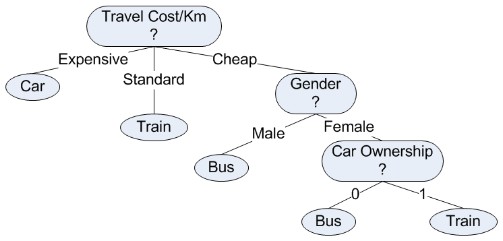The following training data is a part of a transportation study regarding mode choice to select Bus, Car or Train among commuters along a major route in a city, gathered through a questionnaire study. The data has four attributes:
- Gender is binary type, male or female.
- Car ownership is quantitative integer.
- Travel cost/km is quantitative of ratio type, but expressed in ordinal type.
- Income level is also an ordinal type.
| Attributes | Classes | |||
|---|---|---|---|---|
| Gender | Car Ownership | Travel Cost ($)/km | Income Level | Transportation Mode |
| Male | 0 | Cheap | Low | Bus |
| Male | 1 | Cheap | Medium | Bus |
| Female | 1 | Cheap | Medium | Train |
| Female | 0 | Cheap | Low | Bus |
| Male | 1 | Cheap | Medium | Bus |
| Male | 0 | Standard | Medium | Train |
| Female | 1 | Standard | Medium | Train |
| Female | 1 | Expensive | High | Car |
| Male | 2 | Expensive | Medium | Car |
| Female | 2 | Expensive | High | Car |
Based on above training data, we can induce a decision tree as the following:
| Notice that attribute “income level” is not included in the decision tree because the attribute “travel cost per km” would produce better classification than “income level.” |

|